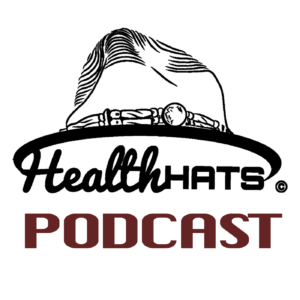This year we are pleased to welcome Danny van Leeuwen as a new member of the Innovation and Value Initiative. Danny is the host of HealthHats, a podcast and blog that helps people learn on the journey towards health. We were delighted that he took the time to speak with our own Jennifer Bright on his podcast and wanted wanted to highlight some of Danny’s other work as well. We connected via Zoom earlier this fall and wanted to share some of this fabulous conversation.
Danny, it’s so good to sit down with you, at least virtually. Could you share a little bit about yourself and your healthcare journey?
So, I am Danny van Leeuwen, and I’m also known as Health Hats. I’m a person living with multiple sclerosis. I’ve been a caregiver to several family members, including their end of life journey. I am a nurse. I have led several electronic health record implementations. I have been a quality management professional and in the C suite. And I sit on multiple advisory committees and boards.
We have hard that you are a musician as well.
I play the baritone saxophone with a Latin band.
That is so cool. And how did you get involved in advocacy?
I think my awareness of being an advocate didn’t really happen until 10 or 20 years ago. I was at a national meeting in Colorado and sat next to a health economist, Jane Sarasohn-Kahn, and told her, “I love your blog, but I could never do that.”
She responded, “We’re having breakfast tomorrow.” And when we had breakfast she asked me to tell her my story. “Well, you wear multiple health hats, and you can do this. You have a story people need to hear.”
I just did my 500th blog post. I have done over 140 podcasts. In fact, I just interviewed Matt Pickering from the National Quality Forum to discuss cost and measurement. Somewhere in there, I realized that I am an advocate, and that I can leverage my many perspectives. Most people wear many hats, but wear them one at a time. I have the gift of being able to wear them all at once.
And I think it depends on who is defining what worth means. And from your perspective, or at least some of your perspectives, what are some of the things that you think are most important when you calculate “value”?
Well, I’m a practical guy. I have certain goals in life. I have a progressive illness. I want to progress as slowly as possible. I play the saxophone and I want to keep playing it as long as possible. Basically, I’m a pathologically optimistic person, and I would rather not mess with that any more than I have to. I would rather not fall. I want to hang out with my grandkids. I want to keep doing the podcast as long as I can. I want to have good habits so I can maintain peak performance, given the circumstances. So it’s about function.
So to skip ahead a bit, how did you get involved with the Patient-Centered Outcomes Research Institute (PCORI) Board and how did you get involved with the research side of value assessment?
Well, when PCORI was first launched in 2012, I was invited to participate on their National Forum of Stakeholders. I like to think that I was invited because I bring so many perspectives. And as part of that stakeholder group, I became a grant application reviewer and then I was invited to join the Communication and Dissemination Advisory Panel – probably because I made the audacious statement that research was only ink on paper, if people didn’t use it.
With the reauthorization of PCORI, I applied to join the PCORI Board, and was shocked when I received 50 nominations to support my application. And so, now, here I am.
I have been so proud because PCORI has been on the forefront of patient engagement and patient driven outcomes. And the leadership at the organization is amazing.
But it’s hard to be out front without controversy. And certainly, the whole question of value is conversational because what is considered value to me doesn’t mean it’s of value to you or anyone else. And, so that involves truly listening. I think PCORI is amazing at listening and translating that listening into meaningful action.
What has been your biggest lesson that you’ve learned in your work with PCORI and with patient-driven research?
In practice, I think there is a yawning gap between what is researched and the questions that everyday people have about living safely or living well or living better. And the people who are really good at getting funded for big dollar grants are part of big institutions that have their own inertia.
It’s a great puzzle.
Research is a big business. And just like any big business, there are vested interests, and it is really hard to break through. And, again, one of the things I like about PCORI is that it invests in building the capacity of regular people and communities, and I think we need more participation from regular people and communities.
What are some of the biggest opportunities in value assessment right now that you see from your vantage point? And how do we improve how we calculate value to include different perspectives?
Well, I think the opportunities include some of the things that you guys are doing, especially clarifying value to whom, measuring cost to patients, caregivers, and communities, and building partnerships with various stakeholders. It’s hard work and resource intensive, and it doesn’t always pan out. But, it does build over time.
What are some of the biggest challenges that you see in value assessment and healthcare research in general?
We need to focus on methodology and innovation in science. Yes, science has made incredible advances in some areas, but often not focused on the priorities of patients. I think it is important that both PCORI and IVI are committed to the evolution of methodology that is more equitable. We need to commit to include “missing people” in research studies, such as those who are homeless or are incarcerated.
We’re only as good as our ability to include populations who are not already part of some kind of system and the results are limited by the data you use.
We’re so pleased that you were able to join our organization but would love to learn why you joined and what you see as an important place for IVI.
I asked my friend, Sara van Geertruyden, who is the executive director of the Partnership to Improve Patient Care (PIPC), for some help to better understand value assessment. And she introduced me to Jennifer Bright. I read about IVI and Jennifer, and invited her to be a guest on my podcast. Our interview confirmed to me that IVI is right up my alley and I joined.
Well, we’re so pleased to have you, and we are really excited to have more people with lived experience to be part of the value assessment conversation. Thank you for such a great discussion.

